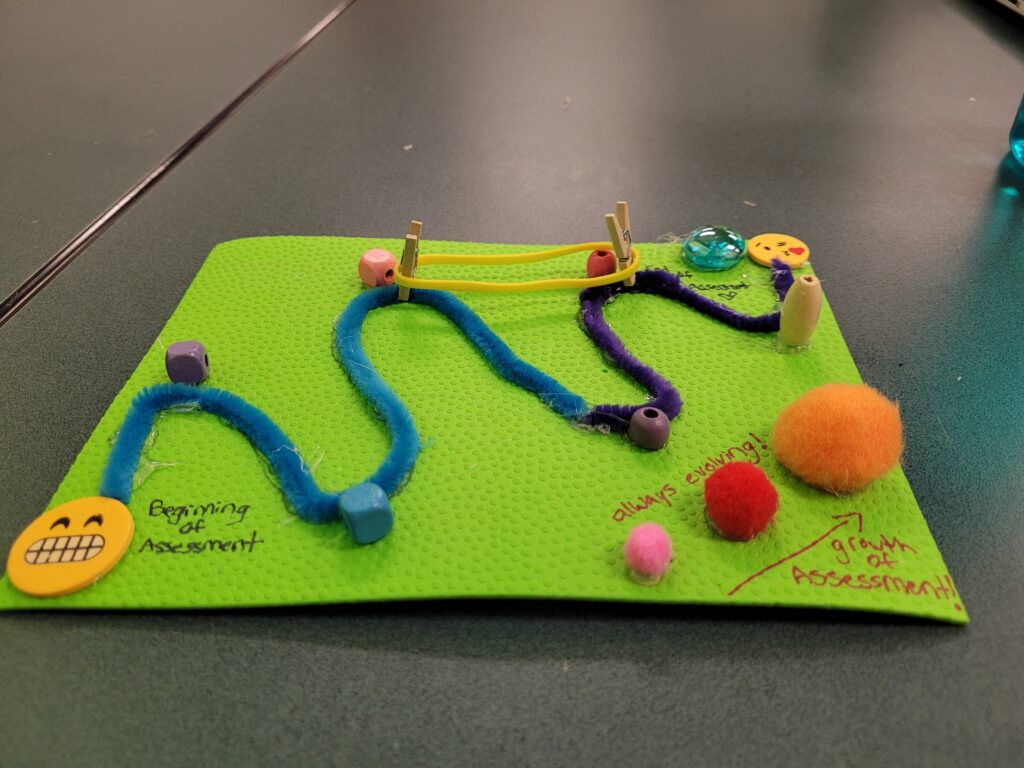
The picture above is my demonstration of assessment. I used pipe cleaners to create a wavy line that represents how assessment can be. I don’t see assessment as a straight clear and easy path, there are turns, bumps and challenges along the way. The beads represent the bumps and questions in assessment. The emoji at the beginning of the assessment represents many emotions such as uncertainty, curiosity and nervousness. The two small wooden clips with an elastic represent how there can be a connection between parts of an assessment. Perhaps something made sense way into the assessment as you were adjusting the criteria and it related to a concept from earlier in the assessment. The end of the assessment there is a loving emoji wink face and a gem stone. The emoji represents how assessment practices are always changing. The gem stone symbolizes a reflection of what you put into assessment is what you get. All the effort and genuine care for students reflects in the results. The three pom poms on the right corner demonstrates the growth of assessment. It may start out small, however as you continue along, there is always so much more knowledge to be gained and it keeps growing and evolving.
Something that came up for me when chatting about assessments with Kelsey Macdonald was the thought of how to decolonize assessments in a colonized world. We had been talking about school systems being colonized and how there is still so much colonial routines that we implement in schools that we may not even realize are in fact colonial. For example, the subjects that we teach in schools they are standardized and there is no choice. Although yes as students go into Highschool they have more elective options there.
What does colonized assessments look like? when students have no voice or autonomy. When there is standardized testing. When there is no consideration of student opinion or choice.
What does decolonized assessment look like? When assessments are student centered, there is student autonomy in their choices of projects and there is also a variety of assessments. It is also when the teacher works with the student to create an assessment that works for both of them.
During my first practicum, I got to see a little bit on how my coaching teacher assessed her students on their sounds and letter knowledge. She showed me the system she created to track the sounds and letters learned over the year. I liked how she was always keen on learning how to improve her assessments and ways to keep assessing their knowledge in the most efficient way. I could see her passion of teaching students how to read through learning sounds first. I feel like her approach was more towards decolonizing because she was was constantly trying to improve her assessment approach and she was learning and adjusting each time she did an assessment on her students.
Teachers have huge impacts on student learning. The feedback they give and how they give it. Children hold onto those initial comments and they become apart of ones confidence and self-esteem as they continue their educational journey. My own experience shaped my insights as I continued my learning. One of my professors during my undergrad commented on the quality of my written paper. Her choice of wording and tone seemed to be more condescending than concerning. Reflecting on it now, I feel that her tone was just her personality as she has a less compassionate nature. She probably was just concerned how I had survived writing essays in university. After this experience, I started going to tutoring for my essays and I would work extra hard on the quality of my paper. Since then, I started to recognize my own growth in my editing and writing abilities. I am grateful for that experience even though it was tough to hear in the moment; I do think it made me a better learner and student. I also think that that that teacher could have been more sensitive with her choice of words. Words matter, they stick with students. That teachers words always have stuck with me however, I chose to improve and I continued on a path of growth instead of shutting down and losing hope. Now when I look back at my papers in my early University years, I notice the difference in my writing style. I am able to recognize my writing growth and that has been empowering. This is the type of teacher I want to be, I want to help my students improve in their abilities and I my approach would be more empathetic and warm. I know it was possible for me to grow in my writing abilities and I believe every child has the ability to consistently grow with practice and the right supports.
Going forward, into my other practicums, I will be noticing ways that teachers are trying to decolonize assessments. This is apart of my inquiry and I intend on observing ways that I see decolonizing happening in the classroom along with my initial inquiry about managing classrooms.





